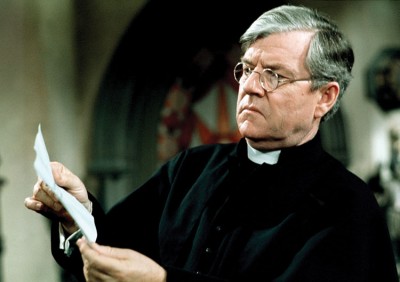| Reviews & Columns |
|
Reviews DVD TV on DVD Blu-ray 4K UHD International DVDs In Theaters Reviews by Studio Video Games Features Collector Series DVDs Easter Egg Database Interviews DVD Talk Radio Feature Articles Columns Anime Talk DVD Savant Horror DVDs The M.O.D. Squad Art House HD Talk Silent DVD
|
DVD Talk Forum |
|
|
| Resources |
|
DVD Price Search Customer Service #'s RCE Info Links |
|
Columns
|
|
|
Father Brown: The Complete Collection
What makes Father Brown so delightful today is watching Kenneth More, something of an unsung, multi-talented actor, in the title role. Born in 1914, More was part of an unsurpassed generation of British actors whose ranks included the likes of Alec Guinness, Jack Hawkins, Harry Andrews and others, thespians superb in a broad range of roles from straight drama to broad comedy. More became a star in a wide variety of British films during the 1950s (Genevieve, Doctor in the House, A Night to Remember, North West Frontier/Flame Over India) but never really caught on in America.
In Britain his career declined in the 1960s, some blaming this on his decision to leave his wife for sexy and much younger actress Angela Douglas, a regular in the "Carry On" films. Though he continued appearing in films occasionally, such as playing the Ghost of Christmas Present in the 1970 musical version of Scrooge, his later-career successes mainly were on television: the 1967 version of The Forsyte Saga and Father Brown. He was diagnosed with Parkinson's disease soon after, and died in 1982.
Acorn Media's Father Brown: The Complete Collection, offers all 13 shows on four single-sided DVDs.
The series adapts original Father Brown short stories written by novelist G.K. Chesterton between 1911-1936, based on parish priest Father John O'Connor. O'Connor's influence was such that Chesterton himself converted to Catholicism in 1922, during the writing of his stories.
Father Brown is today generally viewed as a counterpoint to Sir Arthur Conan Doyle's Sherlock Holmes. Where Holmes's talents lie in scientific deduction, Father Brown's crime-solving abilities are more spiritual and philosophical, rooted in his many years of listening to confession, though just like Holmes he is keenly observant of human behavior. Unlike Holmes he has no ego and no need to perform (a trait common with Hercule Poirot) or compete with plodding policemen, but like Holmes he'll often sit back and observe, judiciously speaking only to point investigators to an important clue or to relate the crime to matters of theology.
Another subtle theme of the original stories also found in the series is the Catholic Father's emphasis on rational explanations for mysterious occurrences that the Protestants surrounding him all too often blame on the supernatural. In "The Oracle of the Dog," for instance, the family and associates of a murdered patriarch quickly accept the sudden howling of the man's dog, some distance away from the crime, as an innate "sixth sense" but the real explanation, uncovered by Father Brown, proves far more simple, logical, and conclusive.
The unassuming parish priest vs. middle- and upper-class Protestants set-up is interesting and a bit unusual (since done to death, with obvious inspirations stretching as far as the American Father Dowling Mysteries series) but all those privileged, over-indulged, carousing English twits do become tiresome after a while, though More's consistently marvelous performance compensates.
Indeed, More inhabits the character as much as Leo McKern did Horace Rumpole or Jeremy Brett did Sherlock Holmes, though More never was overly identified with his role the way the other two were. The supporting casts are great, with appearances by familiar faces like William Russell, Alun Armstrong, Rupert Davies, Peter Copley, Philip Stone, T.P. McKenna, Bernard Lee, Bill Maynard, Roberta Tovey, Peter Dyneley, Charles Dance, and Angela Douglas among them.
Video & Audio
Father Brown was produced in the style typical of ‘70s British television: videotaped studio interiors, with exterior location work shot on 16mm film, and everything edited together on tape. The clash of technologies is difficult for many unaccustomed audiences, like American ones used to either all 35mm or all-on-tape, to aesthetically adjust to, especially for shows like this, which tend to be modestly cinematic with the exteriors but notably stage-like with the videotaped material. The latter tends to involve long takes where the actors rather than the camera do most of the moving around. The performances don't suffer but it is more like watching a filmed stage performance. The mono audio is acceptable and optional English subtitles are included.
Extra Features
Nothing to speak of. A text-only G.K. Chesterton biography. A few clicks on the Internet and you'll find a whole lot more.
Parting Thoughts
Father Brown is a dated but fairly good series made memorable by star Kenneth More's captivating title-role performance. Watch it for him, definitely. Recommended.
Stuart Galbraith IV is the Kyoto-based film historian and publisher-editor of World Cinema Paradise. His credits include film history books, DVD and Blu-ray audio commentaries and special features.
|
| Popular Reviews |
| Sponsored Links |
|
|
| Sponsored Links |
|
|
| Release List | Reviews | Shop | Newsletter | Forum | DVD Giveaways | Blu-Ray | Advertise |
|
Copyright 2024 DVDTalk.com All Rights Reserved. Legal Info, Privacy Policy, Terms of Use,
Manage Preferences,
Your Privacy Choices | |||||||















